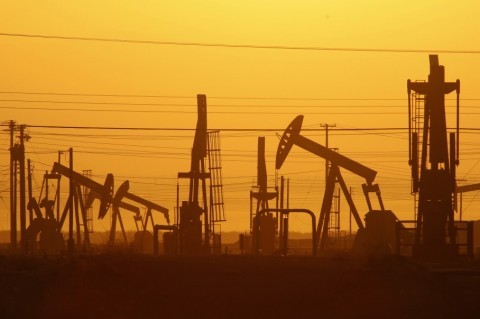
Pump jacks are seen at dawn in an oil field over the Monterey Shale formation where gas and oil extraction using hydraulic fracturing, or fracking, is on the verge of a boom on March 24 near Lost Hills, Calif. Critics of fracking in California cite concerns over water usage and possible chemical pollution of ground water sources as California farmers are forced to leave unprecedented expanses of fields fallow in one of the worst droughts in California history. (Photo by David McNew/Getty Images)
Democrats are in a tough spot on Keystone XL. The for-now-Democratic-controlled Senate is preparing to vote on approving the project, even as the White House has hinted strongly that it would veto that bill.
And as we noted on Thursday, public sentiment is pretty strongly in favor of Keystone -- so much so that even moderate Democrats and Democratic-leaning independents support it. Which puts the White House in a tough spot.
But while Keystone is popular by about a two-to-one margin, environmentalists appear to be making progress on another key front: fracking -- a.k.a. hydraulic fracturing, or the process of injecting liquid into the ground at high pressure in order to extract oil or natural gas.
As of March 2013, the Pew Research Center showed Americans approved of this technique by 10 points, 48-38. As of today, they oppose it, 47-41.
Support for fracking has fallen most notably among younger Americans and among independents, who supported it 51-36 in early 2013 but oppose it 53-37 today.
What's to account for the shift? It's not clear, but fracking is a relatively new technique that Americans are only now becoming more familiar with; As of a 2013 study, about half of Americans hadn't heard anything about fracking or weren't sure whether they'd heard anything about it.
It has generally been more of a localized issue -- and sometimes a pretty intense one -- in areas where fracking has expanded rapidly. One of those places is New York, which has also shown increasing opposition to fracking.
Opponents contend it risks contaminating the ground water, among other possible effects. A town in Texas last week became the first in the state to ban the practice.
The Obama administration is reviewing potential new rules for fracking on federal land. While Obama hasn't made a final decision on Keystone, he has said that the natural gas boom that's resulted from increased fracking could provide a "bridge" between fossil fuels and clean energy.






















